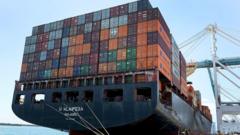In a keynote address at an AI summit in Paris, Vice President JD Vance emphasized a clear vision of U.S. dominance in artificial intelligence, presenting an assertive agenda to European and Asian leaders. He urged the dismantling of existing digital regulations in Europe to align with American technological strategies in the face of rising global competition.
U.S. Vice President Vance Promotes Aggressive AI Strategy at Paris Summit

U.S. Vice President Vance Promotes Aggressive AI Strategy at Paris Summit
Vice President JD Vance underscores an "America First" approach to artificial intelligence, urging global leaders to align with U.S. tech leadership.
In his first international address since taking office, Vice President JD Vance put forth a vision for American dominance in artificial intelligence at a summit in Paris attended by several European and Asian leaders. He warned that countries must choose between U.S.-designed technology and siding with authoritarian regimes that may misuse such advancements. He encouraged European nations to ease their regulatory restrictions in favor of integrating more closely with U.S. tech developments.
Stressing the importance of American-made chips and software for the AI future, Vance adopted a rhetoric that aimed to position the U.S. as the leader in tech innovation while painting a stark contrast with China. He asserted, "The Trump administration will ensure that the most powerful A.I. systems are built in the U.S. with American design and manufactured chips," signaling a clear fork in the road for Europeans regarding their technological partnerships.
This charge for increased collaboration with the U.S. comes as President Trump introduced 25% tariffs on foreign steel, raising tensions with trade agreements in Europe. Vance's remarks received a muted response in a forum where the focus has primarily been on responsible advancements in technology and inclusivity—areas he notably did not address.
As Vance embarks on a week-long tour that includes attending the Munich Security Conference, his message seems to reflect a broader strategy of positioning U.S. technology as the forefront, presenting Europe with a choice that raises significant implications for transatlantic relations.
Stressing the importance of American-made chips and software for the AI future, Vance adopted a rhetoric that aimed to position the U.S. as the leader in tech innovation while painting a stark contrast with China. He asserted, "The Trump administration will ensure that the most powerful A.I. systems are built in the U.S. with American design and manufactured chips," signaling a clear fork in the road for Europeans regarding their technological partnerships.
This charge for increased collaboration with the U.S. comes as President Trump introduced 25% tariffs on foreign steel, raising tensions with trade agreements in Europe. Vance's remarks received a muted response in a forum where the focus has primarily been on responsible advancements in technology and inclusivity—areas he notably did not address.
As Vance embarks on a week-long tour that includes attending the Munich Security Conference, his message seems to reflect a broader strategy of positioning U.S. technology as the forefront, presenting Europe with a choice that raises significant implications for transatlantic relations.






















